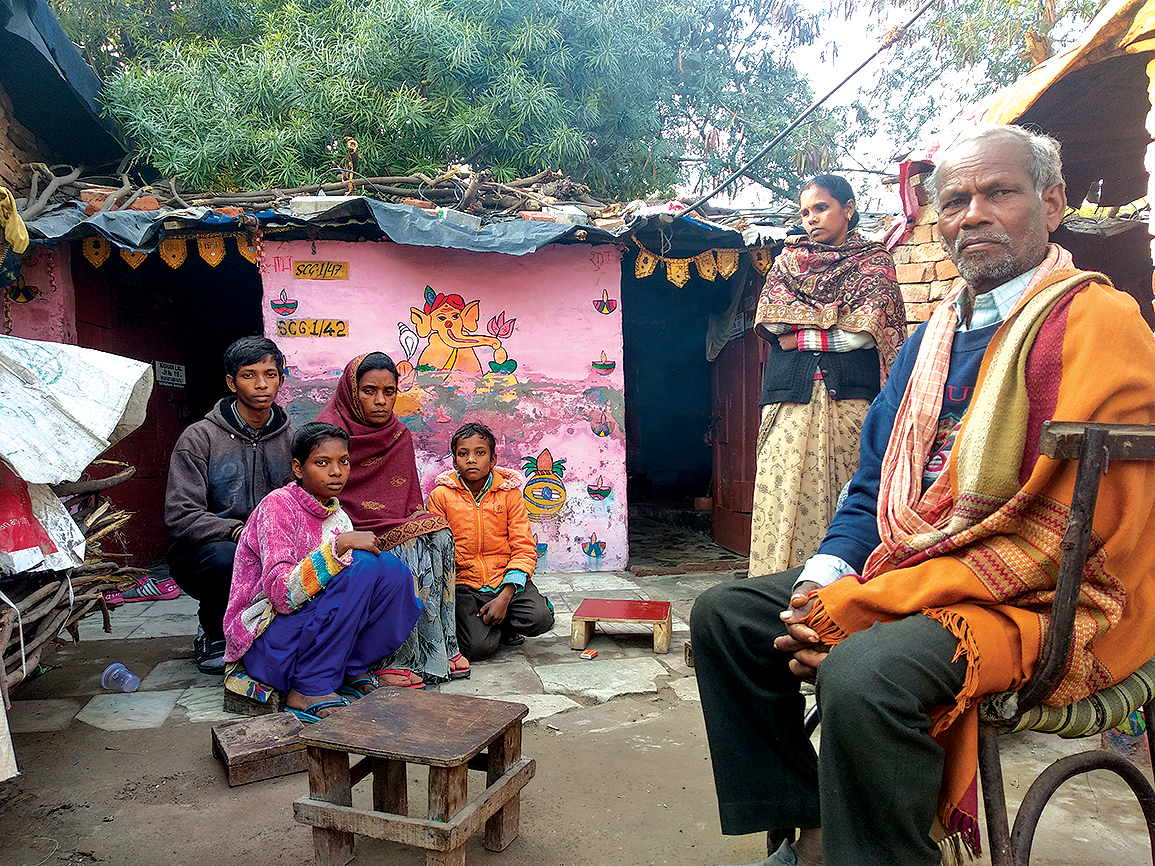
Sitting in a circle outside their home in Shri Ram Basti in North Delhi, warming their hands from a makeshift fireplace, the Lal family is still in shock, trying to recover from the unfortunate death of a family member at the hands of a practice and a so-called profession known as ‘manual scavenging.’
On January 20, Lal along with another colleague went inside a drain in Timarpur area of North Delhi — and that was the last time he was seen alive. After vigorous attempts by the police and fire tenders to save him, Kishan Lal, 37, was finally found dead.
He entered the drain around 3 pm. His body was recovered around 9.30 pm.
The family of five has been reduced to four members. The three children Dinesh (14), Nandini (12) and Kamlesh (10) who go to a local government school are expected to keep themselves busy with studies while dealing with the grief.
Lal’s wife Indu Devi, 35, tries to remain silent. She finds it utterly difficult to recall the incident or any memory of her late husband, the sole bread earner in the family. “Bolke gaye the duphar tak aa jaenge” (He said that he will return by afternoon).
With some more difficulty, she says, “He used to do odd jobs. Any work which could bring Rs 300-400, he would take it,” says Devi.
Lal’s father Kunder Ram, 60, has come from Jahangir Chappa, Chhattisgarh. He nods in agreement to the statements of the neighbours gathered around the home.
“Hum toh inko le jaane aaye hain. Kriya Karam karne jaana hain,” says Ram. (I came to take the family. We have to go perform the last rites). Lal’s mother does not speak at all and keeps weeping.
Filling the verandah outside Lal’s home with their presence, the neighbours are dismayed over Lal’s death. “What will a poor man who has to feed his family do if not take whatever work he’s getting?” asks Mohna, 55, a resident of Shri Ram Basti.
“What will a drunk man do in a drain? For what will he go there if not money?” asks Mohna. He was talking about the allegations made by some official of Flood and Irrigation Department.
The family’s future seems uncertain, but Devi finally speaks and says “They’ve offered me a job. We will go to CM’s residence this week and discuss the future of our family.” The family was visited by Delhi CM Arvind Kejriwal and also by ex-CM Sheila Dikshit. Mohna reveals, “We were also given Rs 25,000 by her.”
Mohna fumes with anger when he spots Lal’s eldest son Dinesh. “Who will look after these children as a father now? Do these children deserve to suffer this loss?” asks Mohna.
Dinesh was able to talk, and also put on a forced smile when answering questions about his life. “The teaching is good at our school. Our father used to check once in a while on our studies. But we complete our homework without anyone telling us to,” says Dinesh.
The family is hopeful that the compensation and the job as promised by CM Kejriwal will bring some hope. However, Devi points out that she doesn’t know what kind of job the offer entails. “But I will take it. What option am I left with?”
The private contractor fled the spot as soon as he came to know that Lal is missing. As per a report of Indian Express, the contractor is in Rohtak “as his wife is ill, and will return to Delhi Tuesday, while the Junior Engineer is recording a statement today.”
In Delhi, 22 people have died while cleaning sewers, septic tanks and in one case a rainwater harvesting pit too.
In November last year, Chief Minister Arvind Kejriwal said, “It’s sad that even after 70 years of Independence, there are certain practices like manual scavenging being done as people are so poor and helpless,” he said after felicitating the first batch of 50 manual scavengers who were imparted vocational
training so that they could pursue other means of livelihood.
He said this during the launch of a skill development programme for manual scavenging to benefit them with better livelihood avenues. However, 23 people have died doing this very work since 2017 in the capital city.
Forcing contractors to provide equipment would have been a better bet.
However, little has been done to eradicate the problem. Although at some places machines are being used, the practice is still prevalent in the city. The recent deaths are a testimony of that.
“It’s sad that even after 70 years of independence, there are certain practices like manual scavenging being done as people are so poor and helpless.” – ARvind Kejriwal
“Delhi is the first State in the country to ban manual scavenging. my government is providing all amenities to the safai karamcharis as per service rules and is taking steps to modernise their working and provide them proper training.” – Sheila Dikshit (2013)
Five quiet corners across Delhi-NCR where February evenings slow the city down, letting breeze, fading…
A solo exhibition by Anjali Mittal exploring emotion, memory and intuition through layered blue-hued paintings
The incident occurred on Saturday near Bakhtawarpur. A senior police officer said a team rushed…
V K Saxena approves 20 per cent reservation, age relaxation, and test exemption for ex-Agniveers…
The fair at Gandhi Darshan brings together emerging and senior artists, showcasing over 200 artworks…
State Names Authority approves renaming of two metro stations and modifies seven others, aligning station…